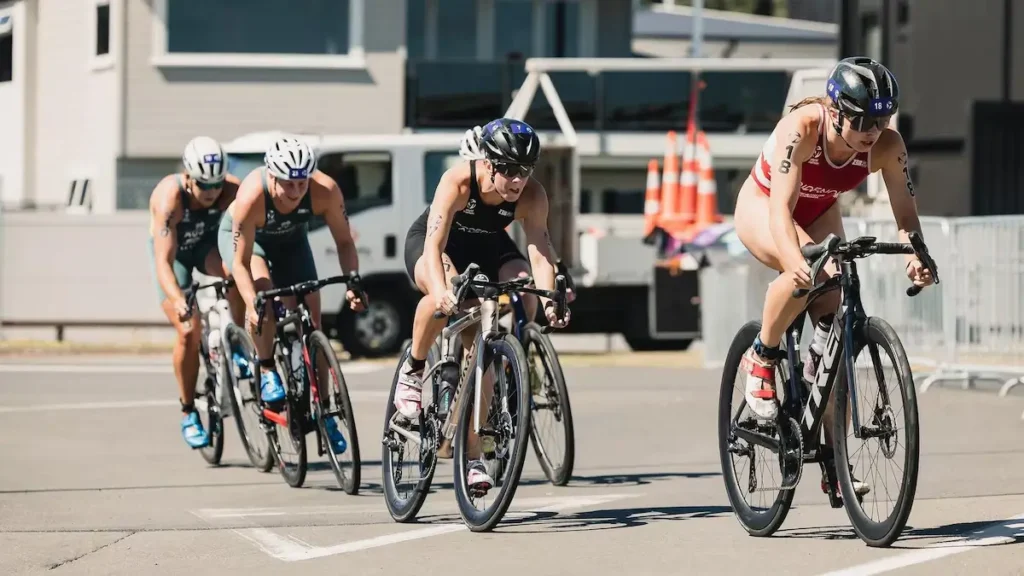Canadian triathlete Desirae Ridenour ended Canada’s 12-year World Cup drought with a thrilling sprint finish in Napier.

I. Introduction
The triathlon world erupted in celebration this weekend as Canadian underdog Desirae Ridenour stunned fans with a gold-medal performance at the World Cup in Napier, New Zealand. Her victory on February 23 marked Canada’s first women’s World Cup triathlon win in 12 years, breaking a drought that stretched back to Amelie Kretz’s 2013 triumph in Edmonton.
Ridenour, a 28-year-old from British Columbia, outsprinted Australia’s Emma Jeffcoat in a nail-biting finish to claim the top spot. This article dives into her electrifying race, her battle through career-threatening setbacks, and her bold ambitions for the 2028 Olympics.
II. The Race and the Victory
Under sunny skies in Napier’s Ahuriri coastal district, Ridenour dominated the sprint-distance event (750m swim, 20km bike, 5km run). Emerging third from the choppy ocean swim, she clung to the lead pack during the bike leg. But it was on the run where she made history. Known for previous sprint-finish heartbreaks, Ridenour dug deep, overtaking Jeffcoat in the final 200 meters to cross the line in 56:24.
“I’ve lost too many sprints—this time, I refused to let it happen,” she later said, breathless but triumphant.
III. Significance of the Win
Ridenour’s victory snapped a dry spell for Canadian women in World Cup triathlon. While Emy Legault earned a podium in Huatulco in 2022, no Canadian had stood atop the podium since Kretz’s 2013 win.
“This feels surreal,” Ridenour admitted post-race. “To follow in Amelie’s footsteps and bring this title back to Canada—it’s a dream.” Her win also reignites hope for a nation eager to reclaim its triathlon prominence ahead of the 2028 Los Angeles Olympics.
IV. Ridenour’s Journey and Overcoming Challenges
Ridenour’s path to glory was anything but smooth. Once hailed as a “top prospect,” her career nearly derailed after a 2021 concussion during a race swim and a harrowing bike collision with a car in training.
“I spent months rebuilding—physically and mentally,” she shared
. Injuries and setbacks tested her resolve, but support from her team and family kept her grounded. “It took an eternity to return to this level,” she said. “But every setback taught me resilience.”
V. Olympic Ambitions and Future Goals
With her World Cup breakthrough, Ridenour now sets her sights on the Olympics. Unlike the sprint format, Olympic triathlon doubles the distance (1.5km swim, 40km bike, 10km run), requiring strategic adjustments.
“I’m not just aiming to participate—I want to contend,” she declared.
Her coach plans tailored training to build endurance while prioritizing injury prevention. “Consistency is key now,” Ridenour emphasized. “Stay healthy, stay hungry—that’s the path to LA 2028.”
VI. Conclusion
Desirae Ridenour’s Napier victory is more than a gold medal—it’s a story of grit rewriting history. From career-threatening crashes to a decade-long national drought, she defied the odds to reignite Canadian triathlon pride.
As she eyes the Olympic stage, Ridenour’s journey stands as a beacon for aspiring athletes: greatness isn’t about avoiding falls, but rising stronger each time.


Pingback: IRONMAN 2025 Rule Changes: The Definitive Guide for Athletes - besttriathletes.com
Pingback: How to Prepare for a Triathlon? - besttriathletes.com